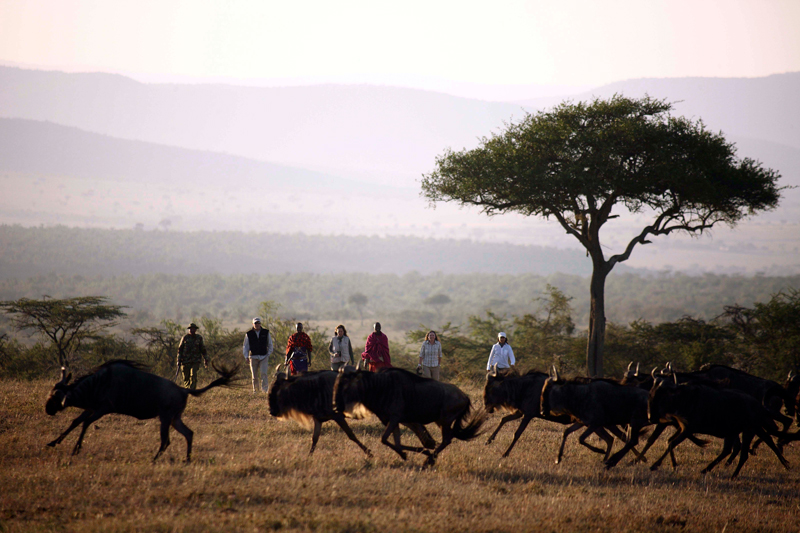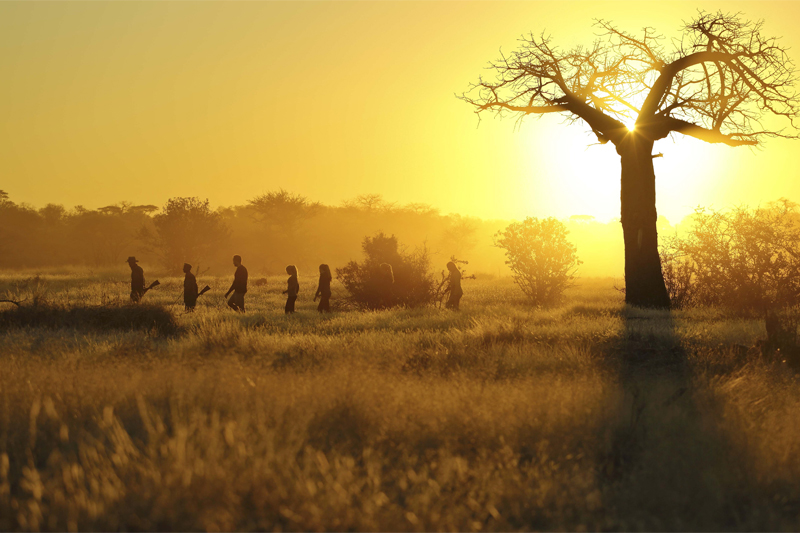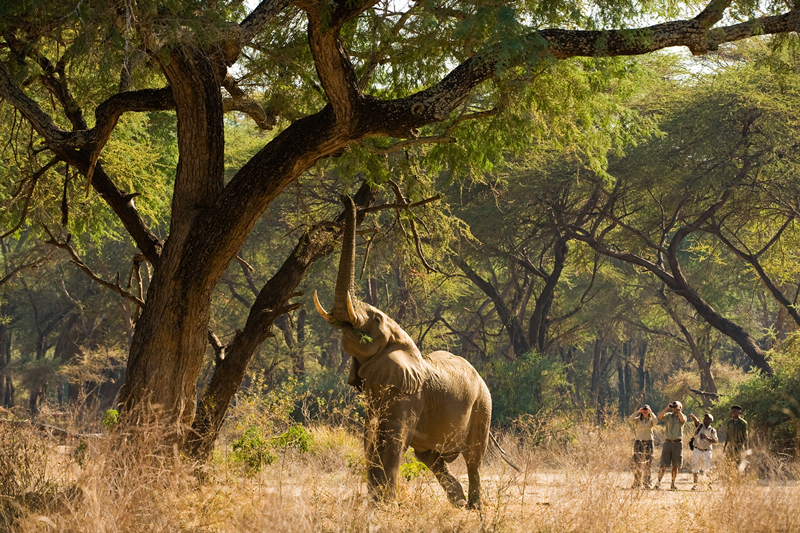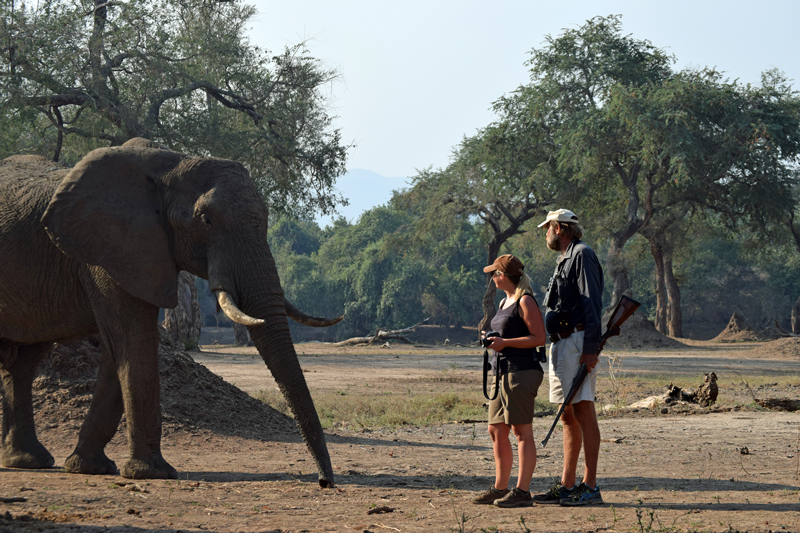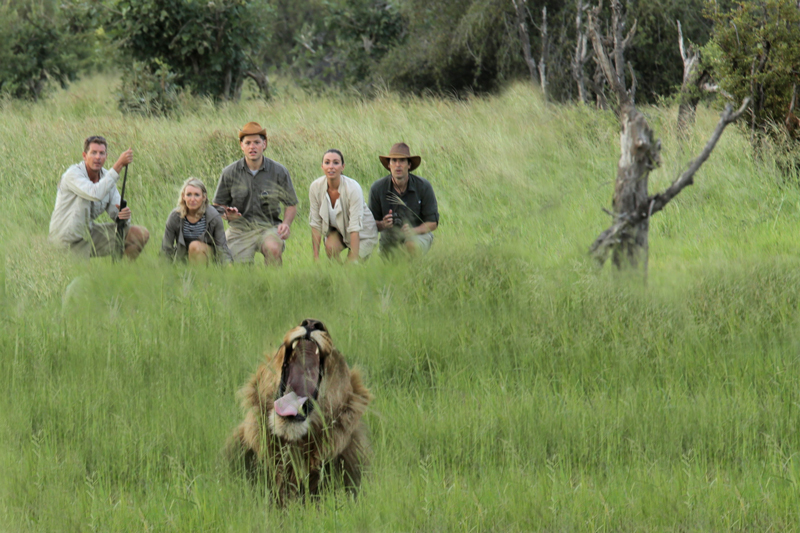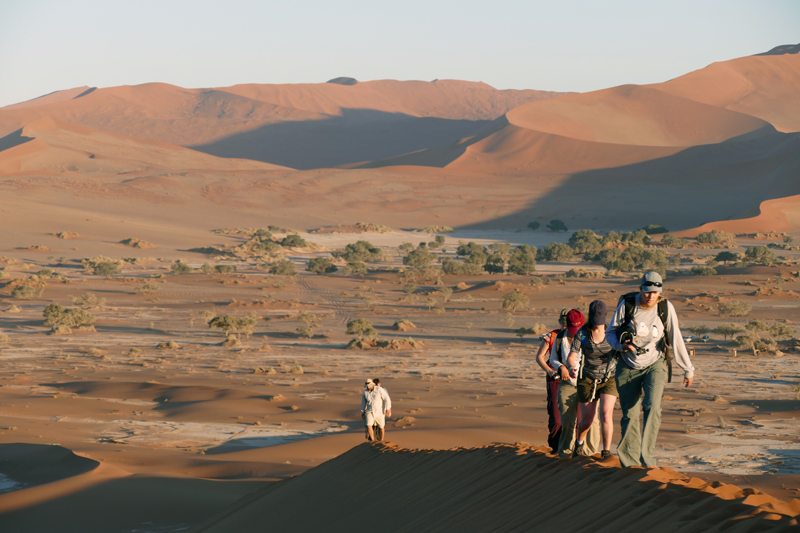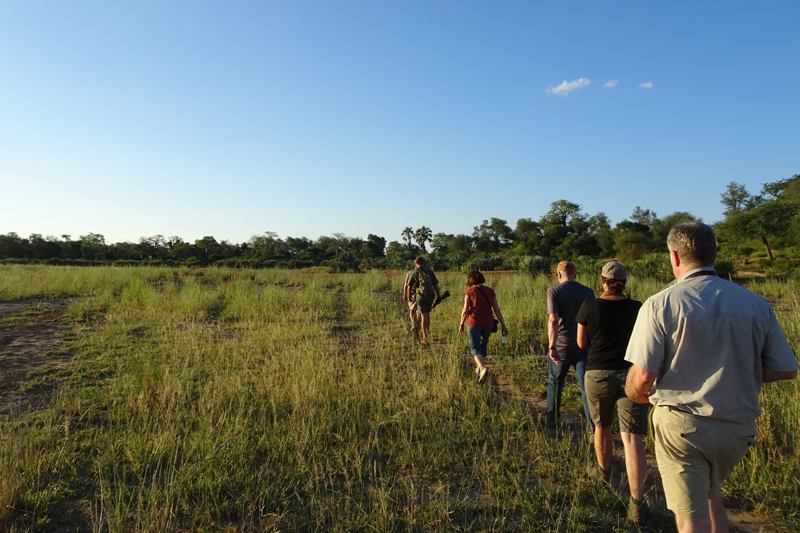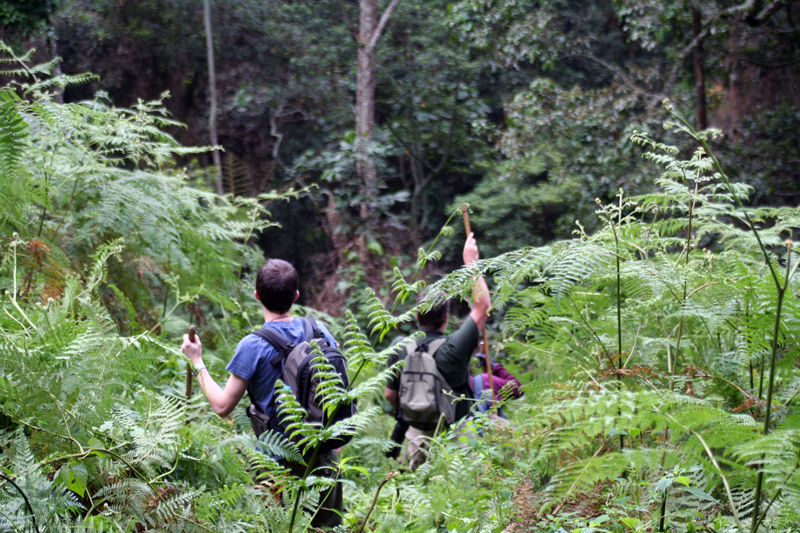Walking Safaris in Africa
A walking safari is one of the best ways to get really close to nature and learn about the intricate workings of the African bush.
You may not always see as much ‘big game’ as you would from a vehicle, but being out in the wilderness on foot allows your senses to come alive – sight, hearing, smell, touch and even taste. A good guide will encourage you to use all these senses, and will teach you how to interpret the incredible natural world around you.
Walking in Africa can take many forms, but traditional walking safaris will usually be through big game areas where the focus of the walk includes both seeing animals and learning about the ecology of the area you are exploring.
Are walking safari guides armed?
Walks will usually be a for a maximum of six participants, and the guides will always be fully trained, and often licensed to carry a firearm. In places where guides do not carry a rifle, a National Parks armed ranger will usually accompany the walk.
How long are the safari walks?
The duration of walks can vary, but between 2 and 5 hours would be normal for a morning walking safari.
Distances walked seldom reach more than 5 or 6 miles and the walking is rarely strenuous, though the ground can be uneven and at certain times of year, temperatures can be very hot by mid-morning. You will stop often to watch animals or discuss things with your guide, or take a drinks break.
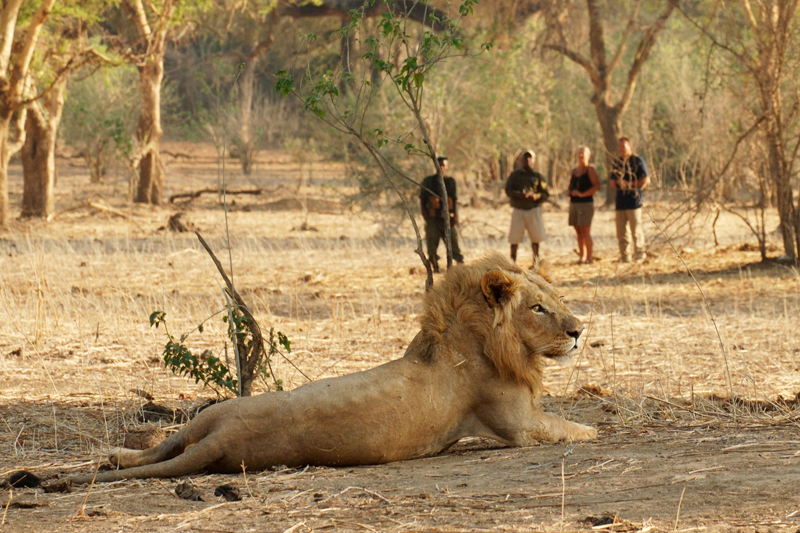
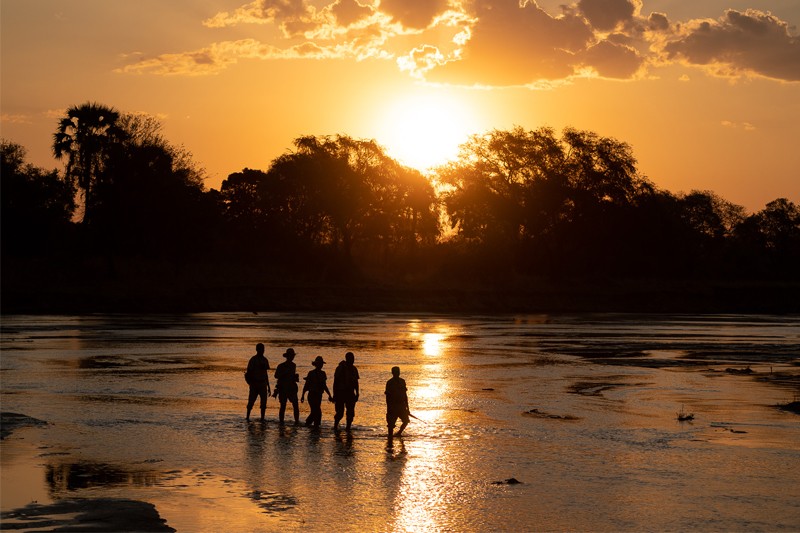
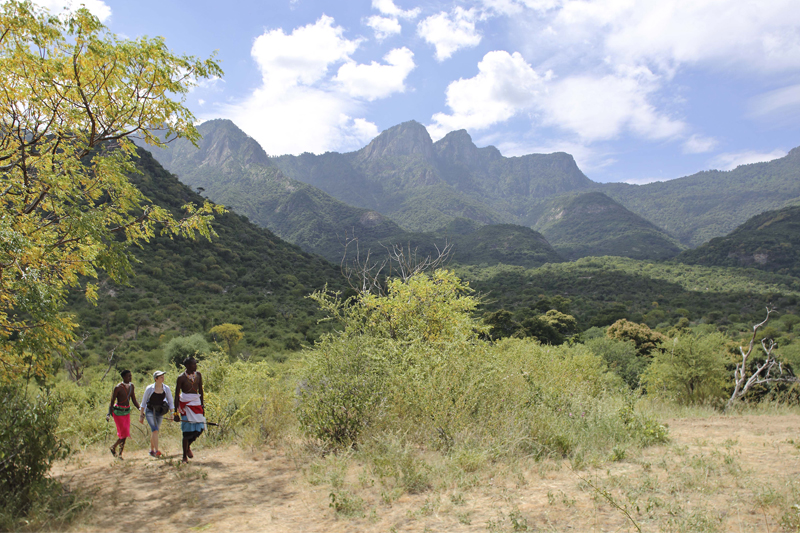
Specialist Safari Walks, Hiking and Trekking
The emphasis is on the experience, not the actual walking, and walks can vary from specialist walks (plants, insects, birds, reptiles, primates, culture, archaeology, rock art etc.), to tracking big game or enjoying more scenery orientated hiking trails.
Where walks focus on topics such rock art, birdlife or botany, much less ground is covered and more time is spent talking and learning.
When the focus of the walk is tracking big game it is necessary to concentrate more on safety, tracking skills and where necessary, cover some distance.
Tailor-Made Walking Safaris in Africa
We are able to tailor your walk safari to include the amount, level and style of walking which will suit you. Most importantly, our specialists have walked throughout Africa. We know many of the best walking guides personally, and we have been out there and tested the different walking options so as to fully understand the experiences on offer.
From desert walking trails in Namibia to tracking leopards in Zambia’s Luangwa Valley or gorillas through the forests of Rwanda, we can advise in detail from personal experience. So if you are looking at undertaking some walking in Africa, please do speak to us on +44 (0) 1787 888590 or email us your requirements through our Contact Us page.
If you are predominantly interested in mountain trekking, please see our Mountain Trekking including Kilimanjaro section. For very specific interests, the below information could well be relevant, but please also see our More Specialist Topics page.
The rest of this page concentrates on walking safaris in big game areas of Africa.
WALKING SAFARI LEVELS
When considering wildlife orientated walking safaris in Africa, there are three basic ‘levels’ you can consider.
OCCASIONAL BUSH WALKS
Daily walks from permanent camps or lodges are great for having a change of activity and exploring the African bush on foot, without compromising on the overall big game experience or the quality of your chosen accommodation.
Bush Walks in Africa can vary in style and duration, sometimes being quite strenuous but more usually being fairly relaxed and suitable for most reasonably fit and mobile adults (most walking safaris will not accommodate young children). In certain locations, they may also be very specific in what they aim to achieve – for instance searching for primates such as gorillas or chimps.
A dedicated walk will often replace a game drive as a half day activity, whilst in certain areas walks are often included in combination with game drives (i.e. you go for a drive, find some animal tracks and then get out and track/approach the animals on foot).
Regardless of the exact circumstances of the walk, you should expect to walk for between one and five hours (primate walks are the exception that can be longer) and you are likely to be choosing a walk as a ‘different experience’ rather than focusing on walking as your main activity.
PERMANENT CAMPS WITH A FOCUS ON WALKING SAFARI
Throughout the safari regions there are a many permanent or seasonal camps and lodges whose primary focus is walking. The style of accommodation can vary from being very adventurous to being pretty luxurious, but either way the camp will inevitably be small, intimate and offer a close to nature experience.
Walks are usually conducted as the main safari activity, with a long morning walk and a shorter afternoon walk. Some camps will also offer game drives, whilst others may have a safari vehicle on hand for back-up support, incidental game drives/transfers and night drives. Our specialists will always be able to advise the exact ethos/focus of any particular camp.
In general these walking orientated camps are ideal for people that wish to get close to nature and do lots of walking without committing to a more adventurous mobile safari. Certain camps can also work well if you want to split your time equally between walking and driving.
MULTI-DAY WALKING TRAILS & HIKING IN AFRICA
The most dedicated form of walking safari would be an overnight or multi-day walking trail which involves spending nights in basic mobile tented camps, lightweight ‘fly camps’ or adventurous bush camps. There are several operators throughout Africa who offer the chance to spend just one night fly camping in the wilderness (or out on a sleep out platform – see our blog article on ‘Africa Under the Stars’), however for really keen walkers it would be multi-day trails that would be of most interest.
Depending on location and season, walks may vary in duration, difficulty and purpose, but there will always be a sense of adventure and exploration. Game concentrations will vary according to region and routes taken. Accommodation can sometimes be quite comfortable with plumbed facilities, but is most likely to be more adventurous with safari bucket showers and long-drop toilets (usually en suite but sometimes shared). Occasionally, you may simply sleep ‘under the stars’.
Multi-day walking trails are perhaps one of the most authentic safari experiences available. Indeed the word ‘safari’ in Swahili means to ‘journey’, and this is exactly what a multi-day trail can offer. Inevitably, such a walking safari takes you far from the madding crowd, and together with your qualified guide you can explore remote habitats, track big game and watch the natural world unfold around you on an adventure that transports you to a different era of travel. Of course, there is also the sense of achievement, not just in terms of the physical exercise but principally in experiencing wild Africa on its own terms.
If you are interested in this style of more dedicated walking safari it is crucial that you speak to us on+44 (0) 1787 888590or email us your requirements via our Contact Us page. We have the experience and knowledge to answer your questions and suggest the right walking adventure for you.
WALKING SAFARIS ACROSS AFRICA
If you are interested in any level of walking safari it will be hugely beneficial to speak to us on+44 (0) 1787 888590 or email us your requirements via our Contact Us page. We have the experience and knowledge to answer your questions and suggest the right walking adventure for you.
If you have a particular country you would like to visit, then the below links will give you more information on walking in those destinations.
All in all, there are many amazing walking adventures on offer throughout East and Southern Africa. Whether you are primarily interested in seeing Africa’s wildlife on a traditional walking safari, or simply love exploring remote and beautiful landscapes on foot, we can help you find the right walking experience. Please call us on +44 (0) 1787 888590 for specialist advice and suggestions, or email us your requirements via our Contact Us page.
Please note that a walking safari is an adventurous activity and being on foot in big game territory is not something to be taken lightly. Responsible behaviour is required 100% of the time and it is crucial that all participants listen to their guide and follow instructions. Your guide will usually be licensed to carry a firearm, but this is not always the case, and it is his duty to keep you safe as well as educate you to the wonders of the natural world. We do not advocate walking without properly trained and licensed guides.


